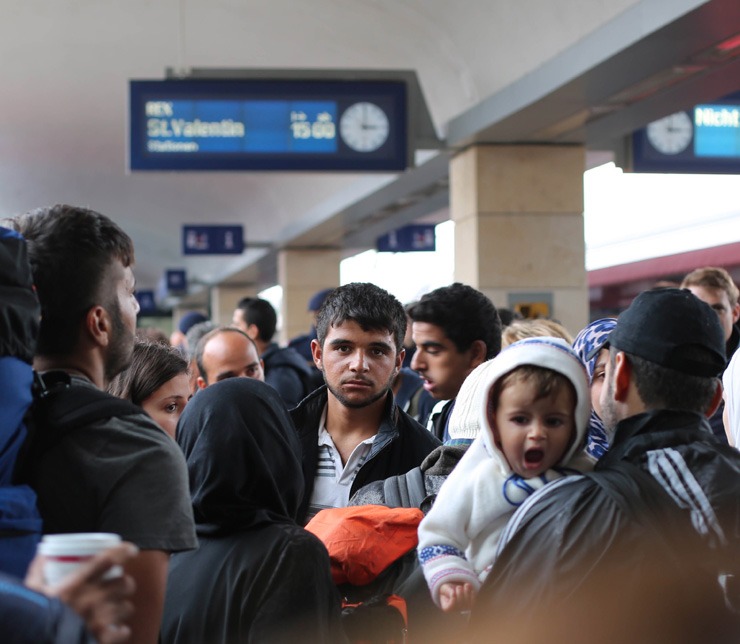photo: Josh Zakary
Republican governors and presidential candidates are tripping over each other to pronounce their horror at the prospect of accepting Syrian refugees, lest some terrorist slips through. Which is, of course, insane: what aspiring suicide bomber would submit himself to the 18-month to three-year vetting process it takes to get refugee status when a simple tourist visa would do the trick in a day? (Shhhhh! Don’t tell Ted Cruz. He’ll want to outlaw tourism to the United States. Wait, editor, stop the presses! Mike Huckabee already went there.)
Meanwhile, people are beginning to draw useful historical parallels—such as this outstanding piece in the San Francisco Chronicle reminding us that in 1939, 67 percent of Americans eschewed a plan to resettle children orphaned by Nazi Germany, seven years later 59 percent opposed a plan to accept European Jews, and that, in 1975, Jerry Brown, during his first go-round as governor of California, tried to prevent refugee planes from Vietnam from landing at Travis Air Force Base in California, lest they take natives’ jobs: “We can’t be looking 5,000 miles away and at the same time neglecting people who live here.”
Great stuff, but the Chronicle missed one important San Francisco-based detail: a warehouse providing temporary housing for Vietnamese orphans had to be kept under armed guards, for fear of vigilante attack.
In my 2015 book The Invisible Bridge, I wrote about America’s hate-filled reaction to refugees arriving here in 1975 fleeing another U.S. military failure that had made their lives at home impossible. In my hope against hope that history not repeat itself, let me present some of the relevant passages here.
First, the nightmare they faced back home when Saigon fell to the Communists, all too familiar to those of us reading the news today:
One and a half million refugees poured south to coastal cities they were told were impregnable to the enemy—“from one end of a sinking ship to another,” wrote The New Yorker’s Jonathan Schell—endless columns of women and children, old men in conical hats, clogging dusty roads to the sea. Along these roads civilians were massacred—not by their ostensible enemy, but by South Vietnamese soldiers, driven by directionless rage. A country, Schell wrote, “tearing itself apart in a frenzy of self-destruction.”
Other refugees boarded ships—“crowding together,” NBC News reported, “without food, without water, starving, dying on the slow voyage south.” Children falling overboard, mothers diving after them; people being thrown overboard, by soldiers desperate to flee themselves—scorpions-in-bottle scrambles for scarce resources….
On March 28 South Vietnamese Marines clamored aboard the last ship to depart the city, the U.S.S. Pioneer Commander, and slaughtered twenty-five civilians. All told, there were 4,000 passengers aboard—but only a few barrels of water. “One woman’s baby had died in her arms while she waited on a barge for four days without water or shelter,” read an Associated Press dispatch. “She became hysterical as she came aboard the freighter and leaped overboard.”
There were airplanes for the refugees, too. But only three civilians made it aboard the last one to lift off. …
And here’s something of the welcome those who made it to America enjoyed when they arrived:
Some of the South Vietnamese who made it to the United States were preliminarily resettled at Eglin Air Force Base in the Florida panhandle—in defiance of a hastily assembled petition got up by residents of the base’s host city, which was called Niceville. A radio poll found that 80 percent of Niceville’s residents didn’t want them. The Associated Press reported, “Children in one school joked about shooting a few.” High school kids spoke in class of plans to organize a “Gook Klux Klan.” A twelfth grade psychology class told their teacher they were worried the refugees would try to convert them to Communism.
“Disease, disease, disease, that’s all I’ve heard,” complained a congressman representing another relocation site, the San Diego County Marine base Camp Pendleton, of the phone calls he was getting. “They think of the Vietnamese as nothing but diseased job seekers.” In Arkansas, at Fort Chaffee, which admitted 25,000 refugees, the compound so well-guarded that a radical journalist compared it to the “strategic hamlets” the U.S. military used to build in South Vietnam. A recently returned veteran told him, “I don’t like the people personally. I didn’t see anything worth saving and I don’t now.” The protest placards read “Gooks Go Home.”
In Detroit, a black autoworker told The New York Times, “People are losing their cars, houses, jobs. Let them stay there until we do something for people here.” In Valparaiso, Indiana, a salesman asked, “How do you know we’re not getting the bad guys? You can’t say for sure. Nobody can, and Lord knows we’ve got enough Communist infiltration now.” President Ford implored, “we can afford to be generous to refugees” as “a matter of principle.” Mayor Daley of Chicago responded, “Charity begins at home.” The Seattle City Council voted seven to one against a pro-settlement resolution. Governor Jerry Brown said Congress’s refugee bill should be amended with a “jobs for Americans first” pledge. Explained Harvard sociologist David Riesman, “the national mood is poisonous and dangerous and this is one symptom—striking out at helpless refugees whose number is infinitesimal.”
Of course, conservatives won’t find in such behavior today any reason to revise their opinions of America as a generous nation bathed in God’s divine grace. As in all things, they will find inspiration in the example of Ronald Reagan, who in one of his daily radio broadcasts in 1975 spun an allegory that let people pretend the cruelty did not exist at all.
Reagan began a broadcast entitled, “Letters to the Editor”:
In these times when so many of us have a tendency to lose faith in ourselves it’s good now and then to be reminded of the good-natured, generous spirit that has been an American characteristic as long as there has been an America.
He then recounted a letter he claimed to have seen from an unnamed American missionary in Vietnam to an unidentified publication.
The reverend described a 20 foot craft adrift in the Gulf of Thailand with no fuel, no food, no water, barely afloat and sinking with its cargo of 82 refugees.
Towering over it was the aircraft carrier the USS Midway. The reference described the Midway as tired. It had already deposited some 2,000 refugees on other ships, refugees who had arrived in more than 500 flights. One flight was a light observation plane not designed for carrier landings. The Midway had moved to up to top speed to enable the pilot to land with an entire family jammed inside the tiny fuselage. There were forty coppers on the deck, brand new F5E fighters and A37s that had carried people who preferred not to be ‘liberated’ by the Communists….
Once onboard they had one question: would they be handed over to an unfriendly government, perhaps to be eventually murdered? The executive office of the ship told him this would not happen. He said, “Our job is to keep you as comfortable as possible, heal the sick, and feed you to your hearts’ content.” That was the official policy of our nation and therefore of the Midway.
He then described a miracle of the loaves and fishes, straight out of the Gospel According to Reader’s Digest:
A tiny baby with double pneumonia was cured. People without clothes were given American clothing. Sailors took the old clothing and washed them for their guests. Pretty soon homeless children were being given piggyback rides on the shoulders of American seamen, and Navy T-shirts bearing the Midway decal began appearing on the little ones… Ads went into the ship’s paper asking for toys. Charity begat more charity.
He concluded: “In the dark days right after World War II, when our industrial power and military power were all that stood between a war-ravaged world and a return to the dark ages, Pope Pius XII said, ‘America has a genius for great and unselfish deeds. Into the hands of America God has placed the destiny of an afflicted mankind.’”
“I think those young men on the Midway have reassured God that he hasn’t given us more of an assignment than we can handle.”
In its eight years in Southeast Asia, the USS Midway had served as a death-dealing juggernaut—a launching pad for air strikes responsible for killing thousands, perhaps millions, of civilians. Listening to Ronald Reagan, you could imagine its only role had been rescuing widows and orphans. That the entire war had been about rescuing widows and orphans. Others told you Vietnam was a crime, a waste—or, at best, something very, very complex. It took Ronald Reagan to explain how simple the whole thing was. Charity begetting more charity: how could it have happened any other way?
The Invisible Bridge is now available in paperback, by the way. Pick up a copy, and read tomorrow’s news today, in just the way it went down 40 years ago.
Rick Perlstein is the Washington Spectator’s national correspondent.




0 Comments